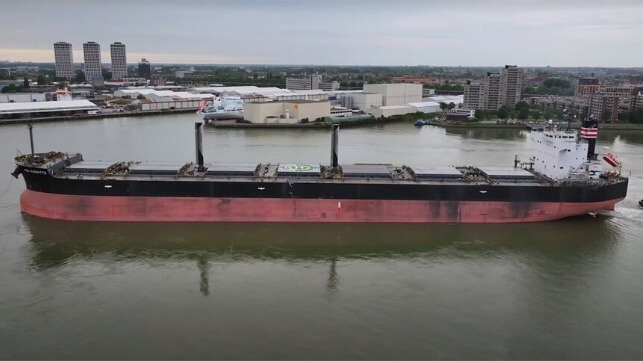NYK Installs Its First Suction Sails on Bulker Chartered by Cargill

Japan’s NYK Group through its NYK Bulkship operator has deployed its first suction sails as it begins to test wind-assisted propulsion. The group joins an expanding number of ships and shipowners exploring wind-assisted propulsion as a tool to aid in reducing vessel emissions.
NYK Bulkship announced plans a year ago to retrofit two wind foils to one of its Panamax bulkers which operates under a long-term charter to Cargill. The installation was completed in Rotterdam earlier this month and the vessel is now bound for Brazil.
Two suction sails were retrofitted to the NBA Magritte, a 2013-built 82,000 dwt bulker. The vessel, which was built by Tsuneishi, is 751 feet (229 meters) and registered in Malta. The equipment was placed between the hatches with each sail standing approximately 52.5 feet (16 meters) and fixed on a 20-foot long base which also permits the sails to fold down. NYK says the sails can be folded in about five to six minutes and operate from a touch panel installed on the bridge.
The suction sail concept works similarly to an airplane’s wing with the difference in air pressure on each side of the wing and a suction port that creates additional propulsion force. The suction design NYK reports is expected to produce five times as much force as compared to foils without the suction design.
With the installation completed, the vessel will collect data on the propulsion generated by the equipment. It will also record meteorological and ocean conditions during navigation. Working with Cargill and NYK R&D subsidiary MTI Co., they plan to analyze the data to measure the unit’s effectiveness.

that matters most
Get the latest maritime news delivered to your inbox daily.
The suction sails were developed by the Dutch-based company Econowind. The company has previously installed its technology on other vessels including short-sea cargo ships and tankers operating on the North Sea.
Cargill which is the charterer of the NBA Magritte is testing a variety of wind propulsion technologies as well as other methods to be at the forefront of sustainable shipping. In addition to wind-assisted propulsion, Cargill has been linked as charterer to the construction of the first large, methanol-fueled bulkers.
